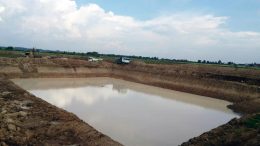
Kampong Thom, Cambodia – Born from a farming family in Panha Chy Village, Tbaung Krampeu Commune, Santuk District, Kampong Thom, But Sovann graduated with a bachelor’s degree in agriculture from Prek Leap School in Phnom Penh. Wearing a smile as he looks at the dug fish ponds, he says, “We are sons of farmers so if we study other subjects, it may be hard for us to compete with others. Most children of farmers in this district don’t study agriculture but other technical skills such as accounting. I see this as an opportunity. We can invest in our community rather than working for others and earning merely USD 200 to 300 per month.”
With knowledge and skills passed on by his father and the learnings from his time spent at Prek Leap Agricultural School in Phnom Penh, Sovann started to invest in raising Pangasius Djambal Fish. He dug four fish ponds, each measuring 36 meters by 50 meters of which two are already rearing breed 80,000 fish.
Oeu Sophorn, Sovann’s father, received agricultural training from organizations and he was a former role model fish farming student. He only farmed at family-scale, but the income from the sale of fish ensured that he could sponsor the agricultural studies of his son. He says that among his four children, But Sovann is the only child showing an interest in this kind of farming. Even as a child, But Sovann wanted to learn about breeding, feeding, and feed production, as recalled by his father. This helped build a base for him. Now, after schooling, But Sovann has even new and better ideas for farming.
According to the analysis of Sovann, most Pangasius Djambal Fish are imported from Vietnam and, during certain months, it is hard to find such fish for sale. Spotting this gap in the market, he decided to dig a fish pond on a large scale. Previously, he failed in fish farming due to his limited experience, lacking a full understanding of the market, not knowing the fluctuating prices of fish and the inability to analyze and manage income and expenses. These lessons encouraged him to do comprehensive studies prior to this second fish farming investment.
Despite his past failure, his father is not reluctant to support his son emotionally and financially. For this second investment, he says, “I am willing to invest in my son’s fish farming. This time there is no pressure from me on him. He wants to do it and he thinks he can do it based on his skills and knowledge. I will not put any blame on him should he fail again. I am just glad to see him stand back up again. It’s a life lesson on the pathway to success.”
Though the success of But Sovann is in the future, this young farmer’s son has a strong belief in this fish farming investment. He is committed to making the best effort to achieve success in large-scale fish farming to pave the way to supply Pangasius Djambal Fish to Siem Reap, which is his first major market.
Sovann is among the many young farmers that benefited from the AFOSP-MTCP2 Programme in Cambodia. #
About AFOSP-MTCP2
AFOSP-MTCP2 is a capacity building program funded by the European Union (EU) with co-financing from the International Fund for Agricultural Development (IFAD) and the Swiss Agency for Development and Cooperation (SDC). The program is being implemented in seven ASEAN countries through the consortium Asian Farmers’ Association for Sustainable Rural Development (AFA) and La Via Campesina (LVC). AFOSP-MTCP2 supports the strengthening of national farmers’ organizations (FOs) and their national platform towards improving their institutional capacity to deliver economic services to their members as well as to effectively engage them in policy processes. At the ASEAN level, the consortium AFA – LVC works in partnership with the ASEAN Foundation in expanding the spaces for the engagement of FOs in ASEAN processes.

Comments are closed